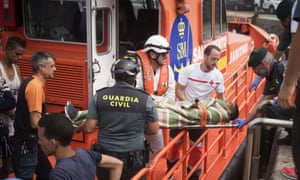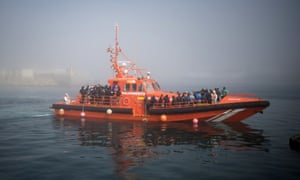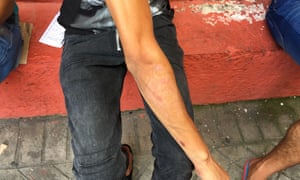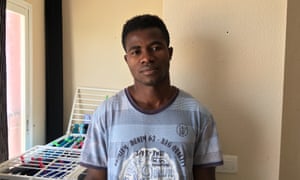
On the hilltops of Tarifa, the Spanish city that faces Morocco across the Strait of Gibraltar and mainland Europe’s southernmost point, gusts of wind power the turbines dotting the landscape.
For the surfers who pack the city’s hotels, the wind is a welcome sign of challenging waves. But for the Spanish coastguard and NGOs, the gusts are a warning that the record numbers of migrants and refugees attempting to cross the 10-mile strait are in grave danger.
The number of refugees and migrants risking the sea journey between Morocco and Spain has been rising sharply, and last week was an exceptionally busy one for rescuers.
On Wednesday, Salvamento Marítimom, Spain’s maritime safety and rescue agency, together with the Spanish Red Cross rescued nearly 600 people from at least 15 different vessels off the coast of Tarifa – the largest figure for a single day since August 2014, when about 1,300 people landed on the Spanish coast in a 24-hour period.
Most attempt the crossing using paddle boats, but others use jetskis, inflatable vessels and rickety fishing boats. According to Frontex, the EU’s border agency, more migrants are dying at sea this year than in 2016. And most who continue to cross know the risks they are taking.
“We prefer to die than to stay there. Death happens once but we prefer to risk our life than stay there,” said Abdou, 29, of the ethnic Amazigh community in the impoverished northern Rif region of Morocco, where hundreds of people have been arrested after recent protests against the state. He was rescued last week along with seven others from an inflatable Zodiac boat they had bought for €4,000 – a cheaper option that avoids the need to pay people-smugglers for passage.
Zakaria, 30, said he was saved by a helicopter last week after coastguards spotted him and others attempting to cross the choppy waters in another Zodiac boat. “I was afraid. If the helicopter didn’t come we would have died,” he said.
Recent clampdowns on routes to Europe via Libya have led to the increase in attempts to reach the continent via Morocco. The International Organisation for Migration (IOM) has said the number of people arriving in Spain by sea this year is likely to outnumber the number arriving in Greece.
According to IOM, 11,849 irregular migrants and refugees reached Spain by sea between 1 January and mid-August. A further 3,500 have made it to two Spanish enclaves in north Africa, Ceuta and Melilla, the only EU land borders with Africa.
Though Spain’s numbers are dwarfed by those of Italy, which has seen 97,376 arrivals so far this year, there is significant pressure on Spanish authorities to make sure it can protect, register and accommodate those arriving on its shores.
Concerns are also growing over the potential for militants to exploit migrant routes into Europe in the wake of terror attacks in Nice, Brussels and most recently Barcelona – all claimed by Islamic State.
Rosa Otero, of the UN’s refugee agency in Spain, said the country was not yet in an emergency situation, particularly when compared with Italy, but authorities were struggling to cope.
“Given the current rise … there are no adequate structures and procedures in place to deal with more arrivals and to swiftly identify international protection and other protection needs,” she said, adding that the shortcomings left migrants – especially children – vulnerable to traffickers.
Every day, between three to four dark green buses marked Guardia Civil arrive in Tarifa to transfer new arrivals to the nearby city of Algeciras, where the Centro de Internamiento de Extranjeros (the alien internment centre) is located. Most arrivals are originally from the west African countries of Nigeria, Guinea and Ivory Coast.
Abdou was one of the men being housed at the Red Cross facility. He said the thought of the trip across the Strait of Gibraltar had frightened him, but he had been determined to make it.The Red Cross, one of many NGOs active in Algeciras, provides asylum seekers with food three times a day and a place to sleep. On Saturday the centre’s rooms were packed with children using computers. Women washed clothes outside.
“What is important is that I’ve left Morocco, nothing else is important. We had a lot of fear, because the sea was sometimes peaceful, sometimes not,” he said. “There’s war. The state of Morocco has conflict with [the Amazigh] people. It’s not like Syria but they put us in jail for political reason. There’s no right[s], no economy, nothing.”
Two brothers, 28 and 19, and their two cousins, both 21, were among those rescued on Wednesday. Like Abdou, they too belong to the Amazigh community.
Last month their city, al-Hoceima on the northern edge of the Rif mountains, was the scene of a million-man march. Moroccan security guards used batons and teargas to quell protesters. Human Rights Watch said at least 185 people had been arrested in connection with the protests and at least 46 of them had been sentenced to 18 months in jail after forced confessions.
The four men made the six-hour, 105-mile journey from Plaga Soaan in el-Hoceima to Motril, on Spain’s south coast, on one jetski. They were kept in custody for two days upon their arrival before being taken to the Red Cross in Algeciras.
Albert Bitoden Yaka, a centre coordinator at Fundación Cepaim in Algeciras, which shelters refugees and migrants in eight different houses in the city, agreed there was a lack of resources to deal with the new arrivals.Those seeking asylum in Spain can wait anything from six months to two years to receive a decision, and a growing backlog means the processing time is getting longer. Local police say local temporary detention centres are so overwhelmed by the number of asylum seekers that they are relying on NGOs to help find accommodation.
“In my opinion, I think the authorities and European states are proving to be inefficient when it comes to addressing this phenomenon, especially the arrival of refugees,” he said.
The Guardian visited one Fundación Cepaim house on Saturday, where seven refugees were sheltered in four rooms in a flat in a large residential block. Residents receive monthly payments of €50 to spend as they wish and €170 for food, until Spanish authorities reach a decision on their asylum application.
“Algeciras is a city of more than 120 nationalities, they know how important it is to live together. It is in moments of like this [after the Barcelona attack] that we realise the impact of having experience in diversity to prevent hostility,” Yaka said.
Larri, a 22-year-old English-speaking refugee from Ghana, lives in a Cepaim house. He said he first tried to reach Europe via the Libya-Italy route, but nearly died when the boat carrying 35 people capsized an hour after their departure.
“Only 12 people survived, the rest all died before our eyes, among them children and women,” he remembered. “I swam and caught the boat, until the next day fishermen came and saw us. They went back and brought help. We were crying, they went back, people came with a boat. I was in sea for one day until 11am.”
“I didn’t know Libya was also fighting,” he said. He worked in Libya for three years before going to Morocco, where he paid 1,000 dinars (£82) to get on a dinghy with women and children.Undeterred, Larri travelled to Morocco in an attempt to reach Spain across the strait. He said he belonged to Ghana’s Bimoba ethnic group, which is fighting a long-running conflict with the rival Konkomba group. He had left Ghana for Libya as soon as he finished junior high school, in search of a better life.
“In this weather, a lot of people die,” he said. “It’s up to God, some people don’t reach, some people reach. The moment you’re in the boat, you’re selling your life, but there’s no solution. [The] only solution [is to] pray God to save you, [to] reach the place, but it’s not easy to enter this sea.”
Asked whether it was worth taking the risk, he said: “Here, it’s 100% better than Ghana. I was suffering, sometime beaten up on my way from Niger to Libya. When I see everything now that I’m in Europe, it was 100% worth taking the risk.”




No comments:
Post a Comment